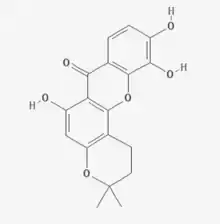Isojacareubin
Isojacareubin is a xanthonoid natural product found in Hypericum japonicum.[1]
 | |
| Names | |
|---|---|
| Preferred IUPAC name
6,10,11-Trihydroxy-3,3-dimethyl-2,3-dihydro-1H,7H-pyrano[2,3-c]xanthen-7-one | |
| Identifiers | |
3D model (JSmol) |
|
| ChEMBL | |
| ChemSpider | |
PubChem CID |
|
| |
| |
| Properties | |
| C18H16O6 | |
| Molar mass | 328.320 g·mol−1 |
Except where otherwise noted, data are given for materials in their standard state (at 25 °C [77 °F], 100 kPa).
Infobox references | |
It has been shown to have antibacterial activity. Isojacareubin also inhibits Protein Kinase C isoforms, and has activity against hepatocellular carcinoma.[2]
References
- Zuo, GY; An, J; Han, J; Zhang, YL; Wang, GC; Hao, XY; Bian, ZQ (2012). "Isojacareubin from the Chinese Herb Hypericum japonicum: Potent Antibacterial and Synergistic Effects on Clinical Methicillin-Resistant Staphylococcus aureus (MRSA)". International Journal of Molecular Sciences. 13 (7): 8210–8. doi:10.3390/ijms13078210. PMC 3430230. PMID 22942699.
- Xing Yuan, Hao Chen, Xia Li, Ming Dai, Huawu Zeng, Lei Shan, Qingyan Sun & Weidong Zhang (2015). "Inhibition of protein kinase C by isojacareubin suppresses hepatocellular carcinoma metastasis and induces apoptosis in vitro and in vivo". Scientific Reports. 5: 12889. Bibcode:2015NatSR...512889Y. doi:10.1038/srep12889. PMC 4526861. PMID 26245668.
{{cite journal}}: CS1 maint: multiple names: authors list (link)
This article is issued from Wikipedia. The text is licensed under Creative Commons - Attribution - Sharealike. Additional terms may apply for the media files.